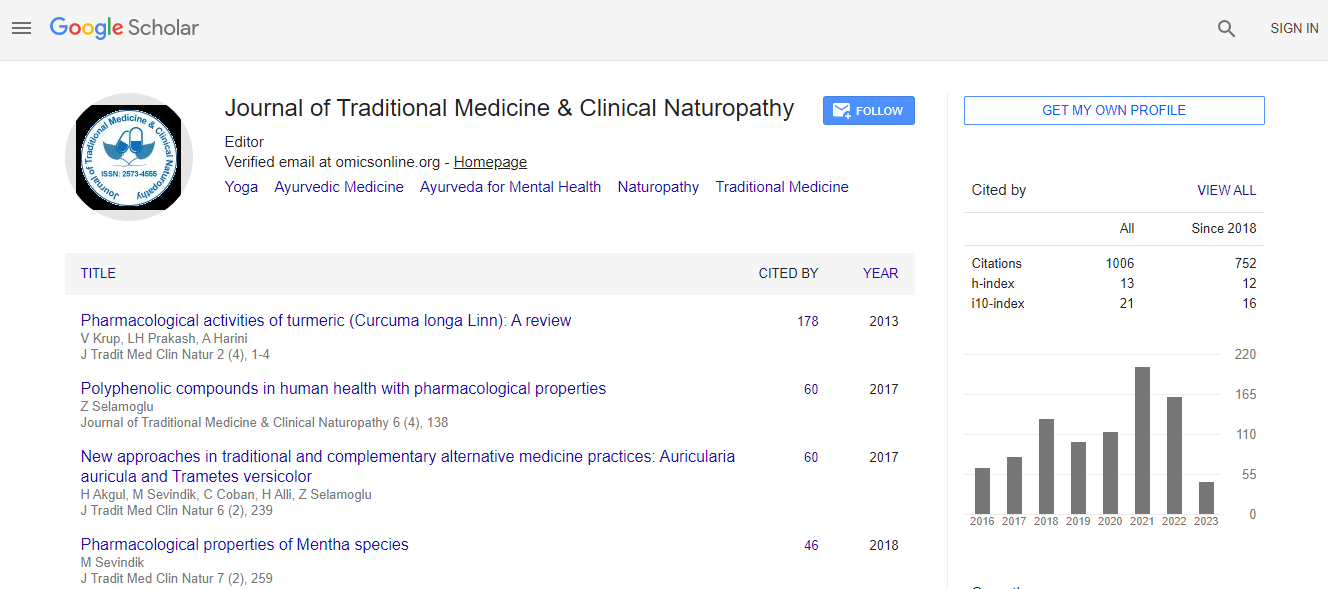Our Group organises 3000+ Global Conferenceseries Events every year across USA, Europe & Asia with support from 1000 more scientific Societies and Publishes 700+ Open Access Journals which contains over 50000 eminent personalities, reputed scientists as editorial board members.
Open Access Journals gaining more Readers and Citations
700 Journals and 15,000,000 Readers Each Journal is getting 25,000+ Readers
Google Scholar citation report
Citations : 1504
Journal of Traditional Medicine & Clinical Naturopathy peer review process verified at publons
Indexed In
- CAS Source Index (CASSI)
- Google Scholar
- Sherpa Romeo
- Open J Gate
- Genamics JournalSeek
- RefSeek
- Directory of Research Journal Indexing (DRJI)
- Hamdard University
- EBSCO A-Z
- Publons
- Geneva Foundation for Medical Education and Research
- Euro Pub
- ICMJE
Useful Links
Recommended Journals
Related Subjects
Share This Page
American ginseng suppresses colitis and prevents colon cancer in mice: Understanding the mechanisms and the molecules
6th International Conference and Exhibition on Traditional & Alternative Medicine
Lorne J Hofseth
University of South Carolina, USA
ScientificTracks Abstracts: J Tradi Med Clin Natur
Abstract
Inflammatory Bowel Disease (IBD) is a chronic inflammatory disease of the colon associated with an increased colon cancer risk. Although inflammation plays a key role, both the mechanistic understanding and the safe and effective treatment of ├ó┬?┬?colitis├ó┬?┬?, are limited. Complementary and alternative medicines (CAMs) can offer a safe and effective option for the treatment of IBD. Over the past decade, we have shown that American Ginseng (AG) and a fraction of AG generated using Hexane as a solvent suppresses colitis and prevents colon cancer in mice. Mechanistically, it appears that key known nodes in the inflammation to cancer sequence, including iNOS, p53, miRNAs (particularly miRNA-29b), and Nrf2, are involved. AG and some of its ingredients also suppress oxidative stress, and DNA damage associated with free radical production during inflammation. Such findings offer an explanation to the observation that AG and HAG prevent colon cancer associated with colitis. Recently, we have isolated one particularly active ingredient from AG, called Panaxynol. Excitingly, Panaxynol targets macrophages for DNA damage and associated cellular apoptosis in vitro and in vivo. Preliminary findings indicate that Panaxynol suppresses macrophage-driven mouse models of disease, including colitis. We are currently drilling deeper to understand the mechanisms. Overall, we have shown in many studies that AG suppresses colitis, and are in a position to begin clinical trials to show efficacy in humans.Biography
Lorne J Hofseth completed his PhD from Simon Fraser University, Canada in 1996. After completing Post-docs at Michigan State University and the National Cancer Institute, he joined the faculty in the College of Pharmacy, University of South Carolina. He is a full Professor, and is currently the Director of Graduate Studies. He has published over 75 articles, and supports his program through several NIH grants.
Email: hofseth@cop.sc.edu

 Spanish
Spanish  Chinese
Chinese  Russian
Russian  German
German  French
French  Japanese
Japanese  Portuguese
Portuguese  Hindi
Hindi 
